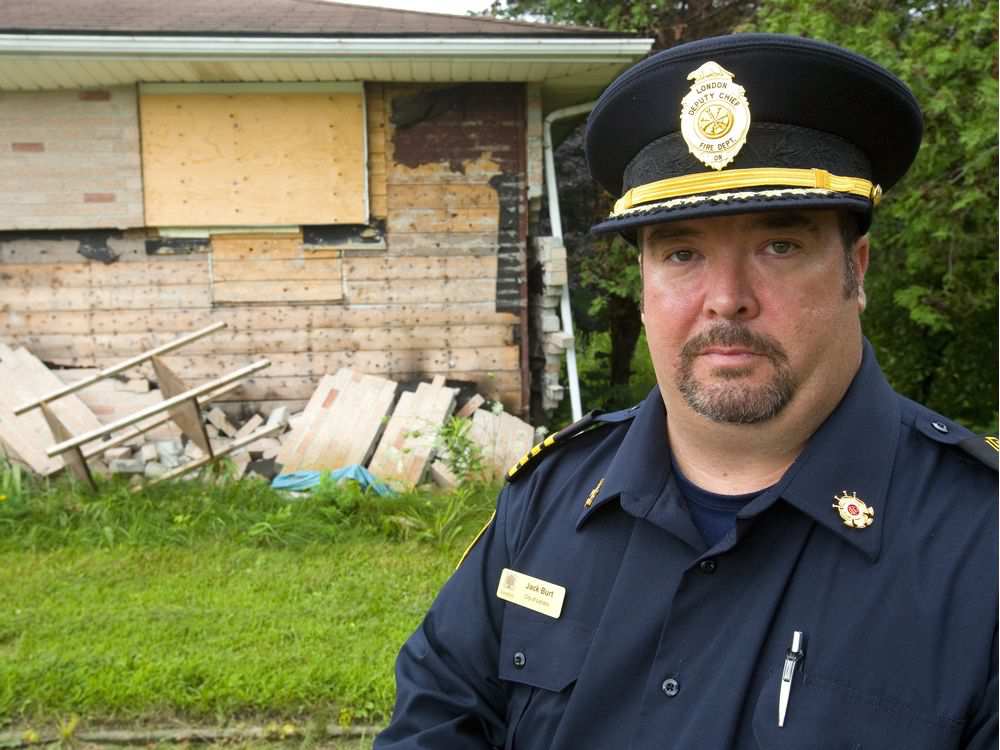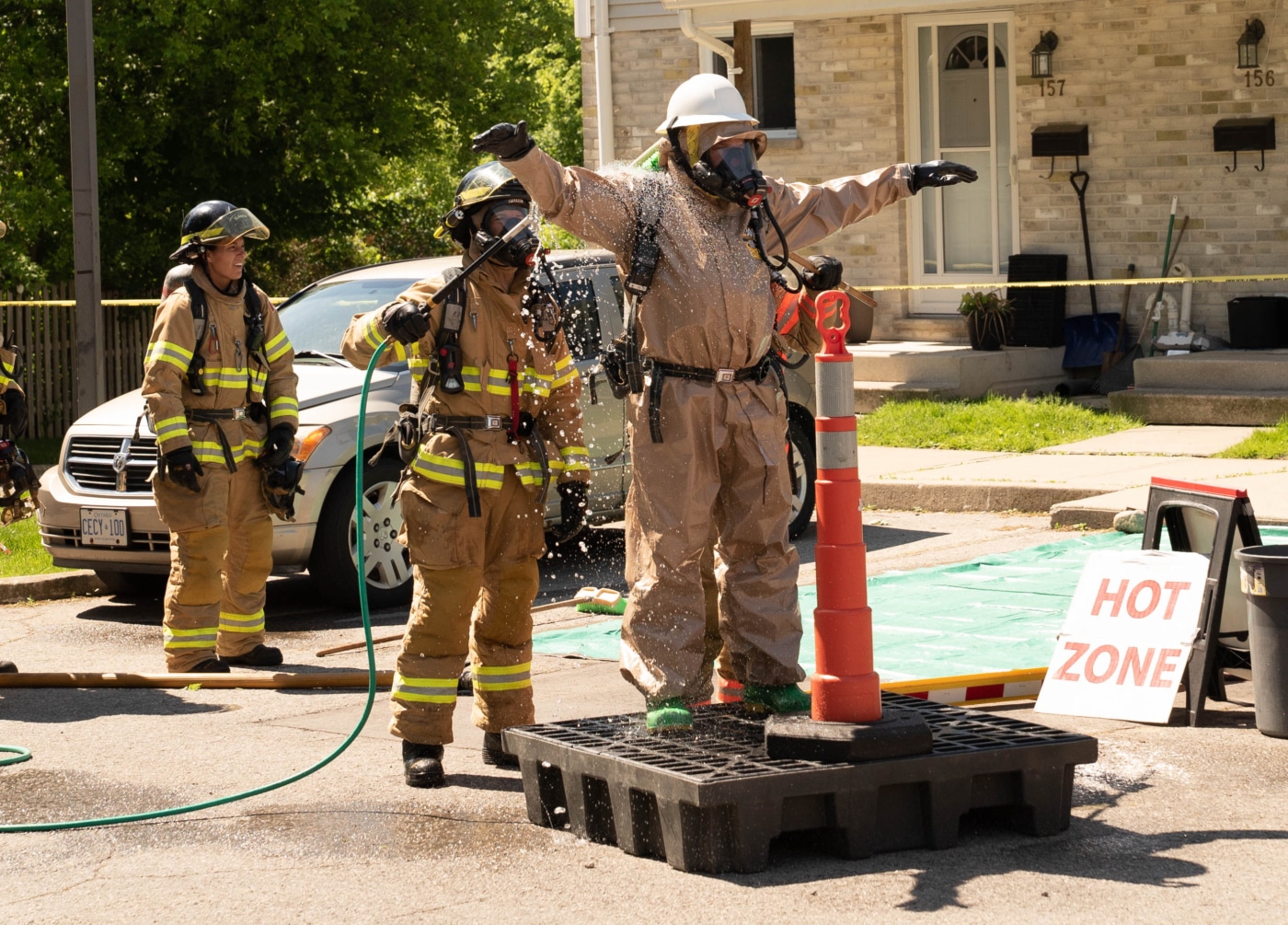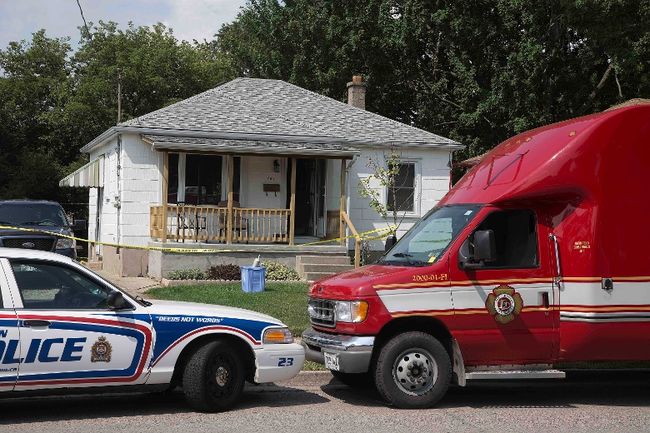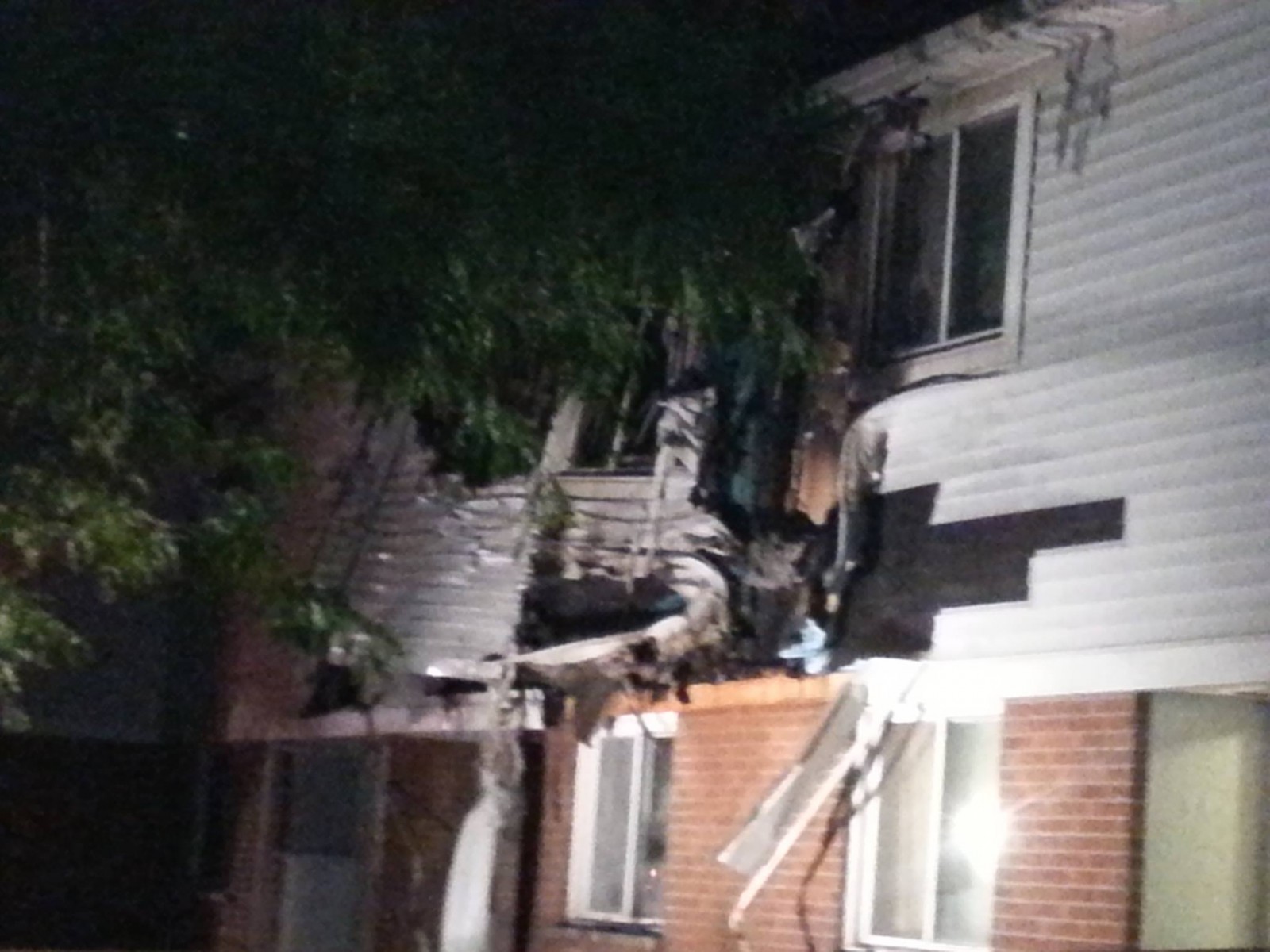Legalized marijuana prompts drug-related explosion, fire warning
Fire officials are worried about a spike in potentially deadly explosions and fires after marijuana becomes legal in October.
An explosion so strong it knocked a home off its foundation.
Blasts that have demolished houses, killed and seriously injured people.
And now, with marijuana legalization around the corner, a worry from fire officials provincewide that the situation could get worse.
A process used to produce hyper-potent marijuana derivatives at home – so-called butane honey oil extractions – is prompting warnings from fire officials and stoking concerns more blazes and explosions are possible once legal pot hits the market Oct. 17 and people attempt to use flammable solvents to refine the drug.
“As the laws become more relaxed regarding marijuana, I think there is the potential for us to see more,” London acting deputy fire chief Jack Burt said.
Only time will tell, Burt said, but London firefighters already have responded to more cases involving butane extractions to produce honey oil, including two in the past year. One, in late 2016, left a man with serious burns to the front of his body.
“He was doing it in the bathroom, when his family was out in the other room. It caused a lot of damage to the house,” he said. “The other was in a shed . . . We are seeing that increase.”
Another butane explosion in the basement of a Hamilton Road home in December was strong enough to blast the bricks off the outside of the house. A man suffered burns to 25 per cent of his body.
Producing the highly potent marijuana derivative, sometimes called honey oil or dab, is extremely dangerous, Ontario Fire Marshal’s investigator Jason Williams said.
It involves using a strong solvent – usually butane, but sometimes propane – to extract THC, the psychoactive ingredient in marijuana, from the plant material.
Using filters and containers, the butane is passed through the marijuana, stripping oil and THC from the buds. The butane is then evaporated, leaving a honey-coloured, highly potent resin behind.
“With the honey oil you can get these days – over 90 per cent THC concentration in a normal marijuana bud – it can be 20 to 30 per cent THC,” said Williams, who’s written papers on butane extractions and testified in court as an expert witness.
“They’re using it in all kinds of things . . . It’s all over the place.”
The provincial agency – which investigates fatal fires, explosions, suspected arsons, drug-related blazes, fires at vulnerable residences or fires that cause more than $500,000 in damage – has probed 40 butane extraction-related fires or explosions in the last five years, Williams said.
There are plenty more, Williams said, probed by local fire investigators because they don’t meet the threshold for the fire marshal to be called in.
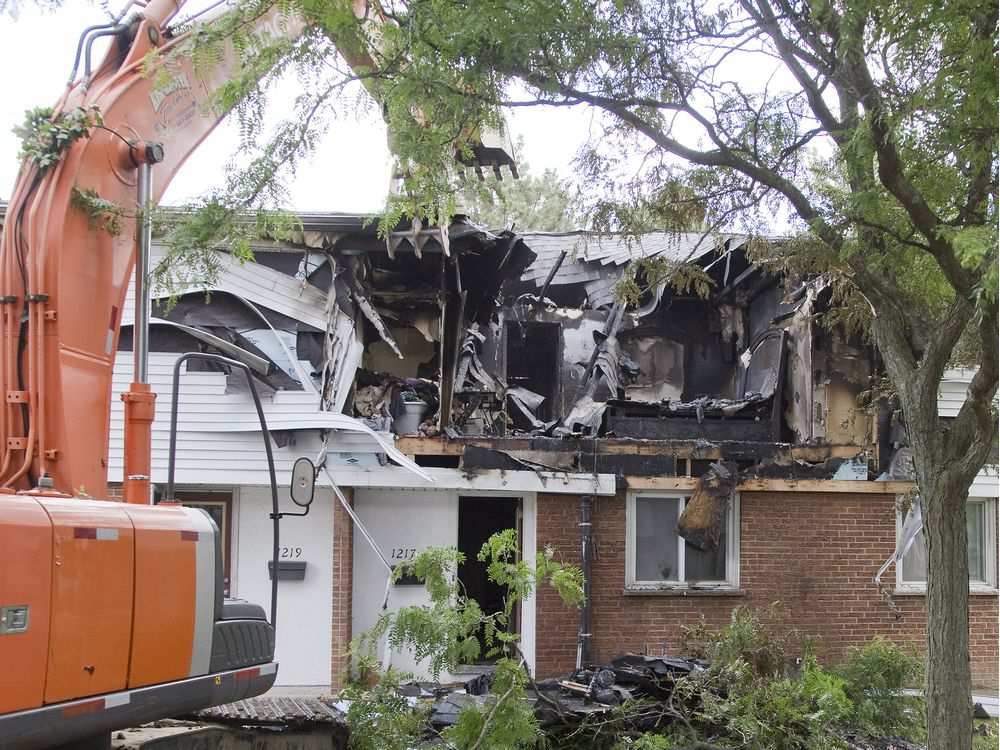
A townhouse on Southdale Road was destroyed and five neighbouring units damaged in an explosion Aug. 15, 2014. More than six dozen cans of butane, used to strip the psychoactive ingredient from marijuana buds, were found in the rubble. (File photo)
Regardless of the number provincewide, it’s a situation the organization is monitoring closely.
“There is a concern . . . It’s been an ongoing issue for quite some time,” said Scott Evenden, fire investigator and operations manager with the Ontario Fire Marshal’s office. “Our concern is the individuals that decide to do this in the absence of knowing what they’re dealing with.”
Butane is liquid in the can, but turns to a vapour in the air, Evenden said. That flammable vapour can collect in enclosed spaces and fuel flash fires or explosions.
Williams is concerned marijuana legalization nationwide, and how readily available butane extraction materials and instructions are, could lead to more people trying to produce honey oil themselves.
It’s already happened in Colorado, Williams said, where the state saw a dramatic spike in butane honey oil extraction explosions in 2014 – the same year it legalized recreational marijuana.
Data compiled by the Rocky Mountain High Intensity Drug Trafficking Area – a government agency that tracks drug statistics in four western U.S. states – found the number of explosions increased by 167 per cent from 2013 to 2014, from 12 reported and confirmed cases to 32.
The jurisdiction had none between 2010 and 2012.
A state law that came into effect July 2015 barred people from using flammable solvents to create honey oil.
People who spark fires or explosions by using butane to process marijuana in Canada can be charged with several offences, including arson by negligence.
Butane extraction explosions and fires aren’t just a danger to the people manufacturing marijuana derivatives, Williams said, they’re potentially harmful to neighbours and emergency crews, too.
“An explosion occurring with butane, I’ve seen it take out several homes. It’s a huge hazard,” he said, adding butane vapours can be extremely volatile.
“I’ve been personally involved in investigations where people have been killed, where people have been seriously injured, where both residential and commercial properties have been completely destroyed.”
Legalized marijuana won’t pose a fire risk on its own, Toronto fire deputy chief Jim Jessop said.
But people circumventing the fire code, using flammable solvents improperly or discharging butane in buildings that aren’t designed for that use, certainly will, he said.
“The concern is what violations of the fire code result, or are contributing, to fire safety risk,” the former London fire deputy and interim Ontario Fire Marshal said.
“The risk is for us and the rest of the public and firefighters is if they are producing it or extracting the drug in buildings that are not compliant with the fire code.”
Butane extraction fires
Feb. 7, 2014: A man was treated for serious burns and a dog died following an explosion and fire that destroyed a home on Alberta Avenue in Woodstock. Investigators recovered several butane canisters from the charred rubble.
Aug. 15, 2014: Investigators recovered 73 cans of butane, eight kilograms of marijuana and an extraction device after an explosion badly damaged a townhouse on Southdale Road. A 29-year-old London man was found not guilty of several drug and arson charges.
Jan. 23, 2016: A man suffered burns to his hands and face after a butane-fuelled fire in a fourth-floor Adelaide Street apartment. A London man pleaded guilty to drug and arson charges and was sentenced to time served.
April 9, 2016: Two people were injured after butane used during drug manufacturing triggered an explosion at a Sarnia home.
Nov. 14, 2016: One man was hospitalized with serious burns to the front of his body after a butane extraction explosion at a Hamilton Road home. The blast happened in the bathroom while a woman and infant were in another room. A man and a woman were charged with four drug and arson offences.
Aug. 6, 2017: A man was taken to hospital with minor burns following a fire at a home near Strand and Oxford streets. Investigators seized 250 grams of marijuana, one gram of cannabis resin and 24 butane canisters. The fire caused $60,000 damage. A 51-year-old London man was charged with two drug and arson offences.
Dec. 4, 2017: A man suffered burns to 25 per cent of his body after a butane extraction explosion in the basement of a home on Hamilton Road east of Highbury Avenue. The force of the blast knocked bricks off the outside of the home. A 35-year-old man was charged with drug possession, producing a Schedule II substance, arson causing property damage and three counts of arson with disregard for human life.
Butane honey oil extractions
- A strong solvent, usually butane but sometimes propane, is filtered through marijuana buds, often packed into a tube.
- The butane strips the psychoactive ingredient, THC, from the plant.
- What’s left is a viscous, potent, honey-coloured liquid.
- The derivatives from the butane extraction can be processed further into shatter, resin or wax.
- Butane is highly flammable. Vapours from a single canister can fill a room.
- Butane-fuelled fires or explosions can be triggered by a flame, static sparks, a heat source or something as simple as turning on a light switch.
Source: Legalized marijuana prompts drug-related explosion, fire warning | The London Free Press

